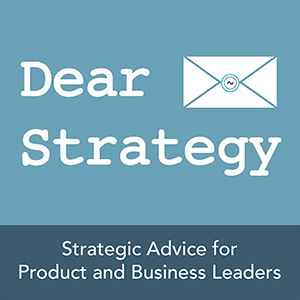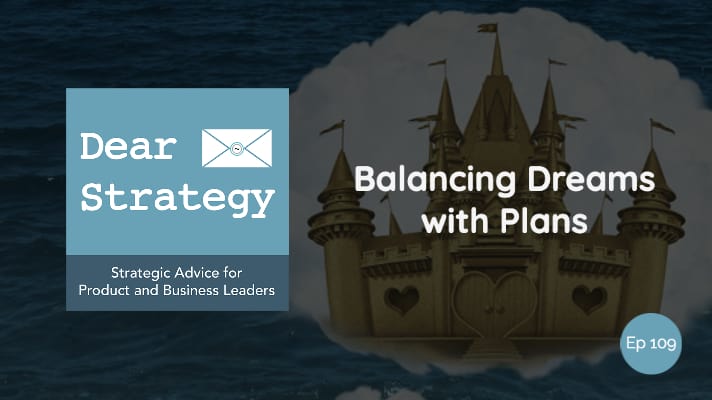On this episode of Dear Strategy, we analyze the stories of two failed ventures – Theranos and the Fyre Festival. Both of these stories started with big dreams and ended in scandal. So how can leaders tell when their own lofty goals are actually bordering on becoming lofty lies? And what should they do about it?
I’m a pretty conservative person. Not exactly in a political way (although not exactly not either), but in the way that I am actually quite reserved when it comes to taking risks, putting myself out there, etc. Even this blog is a struggle for me since I’m forever wondering if I’ve said the right thing, misspoken in some way, or put out an opinion that will go viral in all the wrong ways! If you knew how many times I read these posts before actually hitting the “publish” button, you’d wonder how I have time to write them at all!
The point is, I’m pretty darned safe. Which is why I’m always fascinated when I hear a story of someone who is capable of bypassing all those internal barriers and just running for the wall without an ounce of fear or hesitation whatsoever. I envy that characteristic because it is one that I do not myself possess. And I think many of us are in exactly that same boat.
It should come as no surprise, then, that when leaders arise who have that “anything can be done” attitude, the more risk-averse among us tend to put those people up on pedestals. But, as it turns out, there’s a pretty big difference between dreamers with actual plans and dreamers without them; and it’s not always easy to tell the difference before the pedestal has already been built.
Walt Disney, Steve Jobs, Jeff Bezos, Elon Musk – these are all examples of leaders who fall into the first category of “leaders with plans.” They dreamed big and they had real plans to support those dreams. That’s not to say that every plan was formally written out, but, rather, that those leaders all had lofty goals with achievable strategic actions to back them up. Were they always perfect actions? No. Were they always easy actions? Definitely not. But the fact is that, along with their dreams, they had real initiatives that could be carried out and real goals that could be achieved – as evidenced by the fact that all of those individuals (and many, many more just like them) built some of the most iconic enterprises currently known to mankind.
On the other side of that equation are leaders who have big dreams, but have no real or achievable plans to back them up. And those stories usually end in disaster. The latest members of this unenviable club are the two examples that were mentioned in the opening – Elizabeth Holmes, founder of a medical device company called Theranos, and Billy McFarland, chief organizer of the infamously doomed Fyre Festival.
Now, I won’t go too deep into either of these stories because there are several documentaries that do it far better than I ever could. For the Theranos story, I highly recommend an ABC podcast series called The Dropout, as well as an HBO documentary called The Inventor. For more information about the Fyre Festival, you can check out the Netflix documentary called Fyre, as well as the equally informative Hulu documentary called Fyre Fraud. So I definitely recommend that you go check out those links to get more context on the type of personalities that I’m referring to here.
But the short story for both of these examples is that we had dreamers with great ideas that could have seemingly changed the world, but that also had no clear way of actually making those dreams come true. Figuring that they could take things a day at a time and just push through any barriers that they might face along the way, they found themselves far too deeply invested in dreams that had no chance of ever becoming realities. And when those dreams eventually imploded (as dreams without plans often do), they ended up leaving far too many casualties in their collective wake.
In the case of Elizabeth Holmes, her dream was to develop a device that could run a full panel of blood tests with just a few drops of blood. She got investors on board, customers on board, and even some government agencies on board. But there was only one problem – her dream wasn’t actually possible to achieve. And, so, she ended up applying an overly convincing “can do” attitude to an idea that just couldn’t physically be realized. And it all eventually came apart at the seams.
Similarly, Billy McFarland dreamed of a festival like no other that had ever been experienced. He envisioned a private island decked out with the finest accommodations, the most exquisite cuisine, and a “never been done before” music festival that would feature some of the most popular acts and influencers of the day. So, again, we had another big dreamer with another really convincing “can do” attitude, going after an idea that, as it turned out, just couldn’t be done. Or at least not in the way that he wanted to do it.
As interesting as these stories are, the thing that struck me about both of them is that I have actually seen these same types of scenarios played out dozens of times (albeit on a much smaller scale) inside of companies large and small. Remember that we tend to value dreamers who think big and aren’t afraid. The problem is, we don’t always vet out the other side of that equation; which is, the ability of those dreamers to actually make their dreams come true. And that’s why things sometimes go wrong when we elevate those types of personalities inside of our own organizations.
“We tend to value dreamers who think big and aren’t afraid. The problem is, we don’t always vet out the other side of that equation; which is, the ability of those dreamers to actually make their dreams come true.”
Maybe I watched Elizabeth Holmes’ and Billy McFarland’s stories with a bit too much empathy, but I couldn’t help but translate what I felt was probably going on inside both of their heads. From what I observed, I honestly don’t think they intended to be frauds or swindlers or any of the things they ultimately ended up being. Instead, I think they really believed that they could do the impossible. And, at least at the start of their journeys, they were handsomely rewarded for those beliefs. When presented with barriers, they pushed onward, with no real plan as to how they were going to push through the next hundred barriers that they were likely to face. And they were rewarded for that too. It was only after it became so obvious that their dreams couldn’t be accomplished that the world started to call them out as being liars. But up until that point, they were considered to be “aggressive dreamers.” And that’s a label that tended to carry a lot of clout.
Translating this into day-to-day corporate life, how many times have you been presented with “stretch goals” or far-reaching visions without any real plans on how you can go about reaching them? How many times have you been told that you have to achieve exponential growth without having access to any of the additional resources or capital that will inevitably be required to help get you there? How many times have you been told to “just make it happen” even though you know that what you’re being asked to do has no real chance of ever actually succeeding? Don’t get me wrong, I’m all for aiming high. But when leaders aim beyond any reasonable sense of reality and without any real plans to help get them there, I can’t help but think that those are just smaller scale examples of exactly the same syndrome that brought Theranos and the Fyre Festival to their knees.
In short, what I’m saying is that Elizabeth Holmes’ and Billy McFarland’s stories aren’t just human-interest examples of bad people doing bad things. Sure, it may have appeared that way in the end. But, if you look a little deeper, you might find a lesson that can be applied into your own far less extreme workplace environments as well. And that is, if you have a dream, big or small, make sure you have a real plan to back it up. Your plan may not be perfect, and it is more than likely going to change many times along the way. But if you focus only on your dream and assume that you’ll be able to figure out the rest as you go – well, that’s where your dream might just turn into a lie. And that’s a position you never want to find yourself in.
Listen to the podcast episode
Dear Strategy: Episode 109

Are you interested in strategy workshops for your product managers or business leaders? If so, please be sure to visit Strategy Generation Company by clicking the link below:
 Bob Caporale is the founder of Strategy Generation Company, the author of Creative Strategy Generation and the host of the Dear Strategy podcast. You can learn more about his work by visiting bobcaporale.com.
Bob Caporale is the founder of Strategy Generation Company, the author of Creative Strategy Generation and the host of the Dear Strategy podcast. You can learn more about his work by visiting bobcaporale.com.






